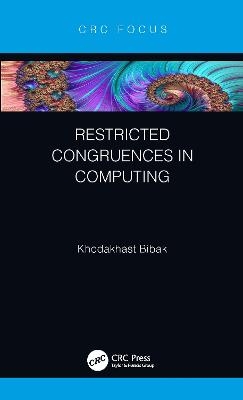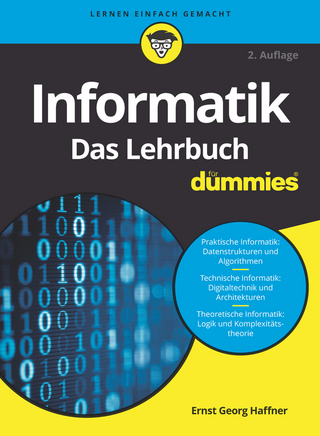
Restricted Congruences in Computing
CRC Press (Verlag)
978-0-367-49731-6 (ISBN)
Congruences are ubiquitous in computer science, engineering, mathematics, and related areas. Developing techniques for finding (the number of) solutions of congruences is an important problem. But there are many scenarios in which we are interested in only a subset of the solutions; in other words, there are some restrictions. What do we know about these restricted congruences, their solutions, and applications?
This book introduces the tools that are needed when working on restricted congruences and then systematically studies a variety of restricted congruences. Restricted Congruences in Computing defines several types of restricted congruence, obtains explicit formulae for the number of their solutions using a wide range of tools and techniques, and discusses their applications in cryptography, information security, information theory, coding theory, string theory, quantum field theory, parallel computing, artificial intelligence, computational biology, discrete mathematics, number theory, and more.
This is the first book devoted to restricted congruences and their applications. It will be of interest to graduate students and researchers across computer science, electrical engineering, and mathematics.
Khodakhast Bibak is an Assistant Professor at the Department of Computer Science and Software Engineering at Miami University. He was a Postdoctoral Research Associate at the University of Illinois, Urbana-Champaign, and a Postdoctoral Research Fellow at the University of Victoria, where he also received his PhD (2017). Dr. Bibak previously studied at the University of Waterloo, where he was also a member of the Centre for Applied Cryptographic Research (CACR).
Preface
Dedication
1 Introduction
1.1 Motivation
1.2 Overview of the book
2 The Restricted Congruences Toolbox 6
2.1 Ramanujan sums
2.2 Some useful identities
2.3 The discrete Fourier transform
2.4 Universal hashing and its variants
2.5 Multilinear Modular Hashing
2.6 Fuchsian groups and Harvey's theorem
2.7 Counting epimorphisms via homomorphisms
2.8 Generating functions for graph enumeration
2.9 Deletion correcting codes
2.10 Weight enumerator of a code
2.11 Gaussian integers, spectral graph theory, characters
3 The GCD-Restricted Linear Congruences
3.1 Introduction
3.2 Linear congruences with
3.3 An equivalent form of Theorem 3.2.4
3.4 Some problems
4 Applications in Universal Hashing and Authentication with Secrecy
4.1 Introduction
4.2 Generalized Multilinear Modular Hashing
4.3 GRDH
4.4 Applications to authentication with secrecy
4.5 Discussion
5 Applications in String Theory and Quantum Field Theory
5.1 Introduction
5.2 Counting surface-kernel epimorphisms from Γ to Zn
5.3 A problem
6 Alldiff Congruences, Graph Theoretic Method, and Beyond
6.1 Introduction
6.2 Graph theoretic method
6.3 Unweighted alldiff congruences
6.4 More applications and connections
6.5 A problem
7 Alldiff Congruences Meet VT Codes
7.1 Introduction
7.2 Main results
8 Binary Linear Congruence Code
8.1 Introduction
8.2 Weight enumerator of the Binary Linear Congruence Code
8.3 Weight enumerators of the aforementioned codes
9 Applications in Parallel Computing, AI, etc
9.1 Application in parallel computing
9.2 Application in arti□ficial intelligence and computational biology
9.3 Application in the Subset-Sum Problem
10 Quadratic Congruences, Ramanujan Graphs, and the Golomb-Welch Conjecture
10.1 Introduction
10.2 Quadratic congruences
10.3 Proof of the conjecture
10.4 A problem
Bibliography
Index
| Erscheinungsdatum | 22.04.2022 |
|---|---|
| Verlagsort | London |
| Sprache | englisch |
| Maße | 138 x 216 mm |
| Gewicht | 213 g |
| Themenwelt | Mathematik / Informatik ► Informatik ► Theorie / Studium |
| Mathematik / Informatik ► Mathematik ► Angewandte Mathematik | |
| Technik ► Elektrotechnik / Energietechnik | |
| Technik ► Umwelttechnik / Biotechnologie | |
| ISBN-10 | 0-367-49731-X / 036749731X |
| ISBN-13 | 978-0-367-49731-6 / 9780367497316 |
| Zustand | Neuware |
| Informationen gemäß Produktsicherheitsverordnung (GPSR) | |
| Haben Sie eine Frage zum Produkt? |
aus dem Bereich


